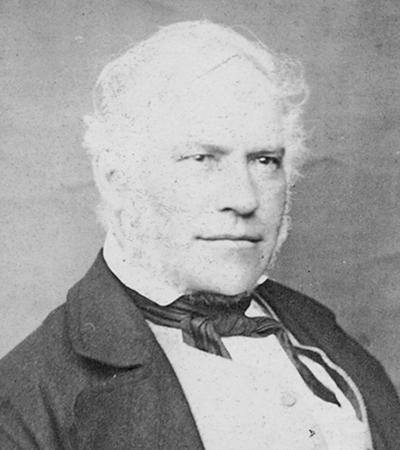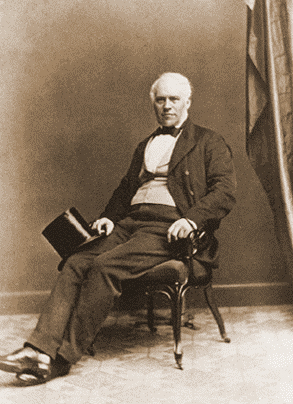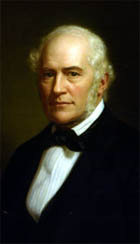<Back to Index>
- Astronomer César François Cassini de Thury, 1714
- Writer Henrik Arnold Thaulow Wergeland, 1808
- President of the Althing of Iceland Jón Sigurðsson, 1811
PAGE SPONSOR



Jón Sigurðsson (June 17, 1811 – December 7, 1879) was the leader of the 19th century Icelandic independence movement.
Born at Hrafnseyri, near Arnarfjörður in the Westfjords area of Iceland, he was the son of a pastor, Sigurður Jónsson. He moved to Copenhagen, Denmark, in 1833 to study grammar and history at the university there. Subsequently Jón began to work at the Arnamagnæan Collection which was then the home of the manuscripts of the Icelandic sagas.
He became an expert on the sagas and on Icelandic history. He never
graduated from university, as Icelandic politics grew to consume all
his time. Before Jón moved to Denmark he proposed to his cousin, Ingibjörg Einarsdóttir,
and she and her father, Jón's uncle, accepted the proposal.
However Jón and Ingibjörg did not marry until 1845, when
Jón came to Iceland for the first time since 1833 to sit at the
restored Alþing. Jón had been elected to the Althing in 1844 as an MP for Ísafjörður county.
He managed to hold on to this seat through his whole life although he
didn't come to all sessions of the Althing. In all, he came to 13 of
the 17 sessions that were held in his lifetime. He also came to the Þjóðfundur (National meeting) in 1851. There he led the Icelanders in their resistance to the adoption of Denmark's Grundlov from
1849 in Iceland. The Grundlov was never formally adopted in Iceland and
after years of struggle the Danish Government granted Iceland a limited
constitution in 1874 giving autonomy in internal affairs. Until then
the Althing had only been an advisory body to the Danish government and
king. Jón's way of communicating with the Icelandic nation from Denmark where he lived was to publish an annual magazine called Ný félagsrit (New
Association Writings). It was published almost every year from 1841 to
1873 with Jón always being the main contributor and financial
backer. The
home of Jón and Ingibjörg in Copenhagen became a centre for
all Icelanders in the city. They had no children except for one
foster son who was Jón's nephew. However, a contemporary
remarked that "all Icelanders are their children". His birthday, June 17, was chosen as Iceland's National Holiday to recognize his efforts toward Icelandic independence, and a picture of Jón graces the 500 Icelandic Krona banknote. He is often referred to as President ("Jón forseti") by Icelanders. The main reason for this is that since 1851 he served as President of the Copenhagen Department of Hið íslenska bókmenntafélag (the
Icelandic Literature Society). He was also the president of Althing
several times, for the first time in 1849. He is currently pictured on
Iceland's 500 krónur bill,
and has been honoured on Icelandic postage stamps on the centenaries of
his birth and death, the 150th anniversary of his birth, and on the
creation of the Republic of Iceland (on his 133rd birthday). The apartment which Jón and Ingibjörg rented in Copenhagen from 1852 is called Jónshús and
has been the property of the Icelandic government since 1967. It serves
as a cultural center for Icelanders in Denmark, and as housing for
academics on sabbatical.
